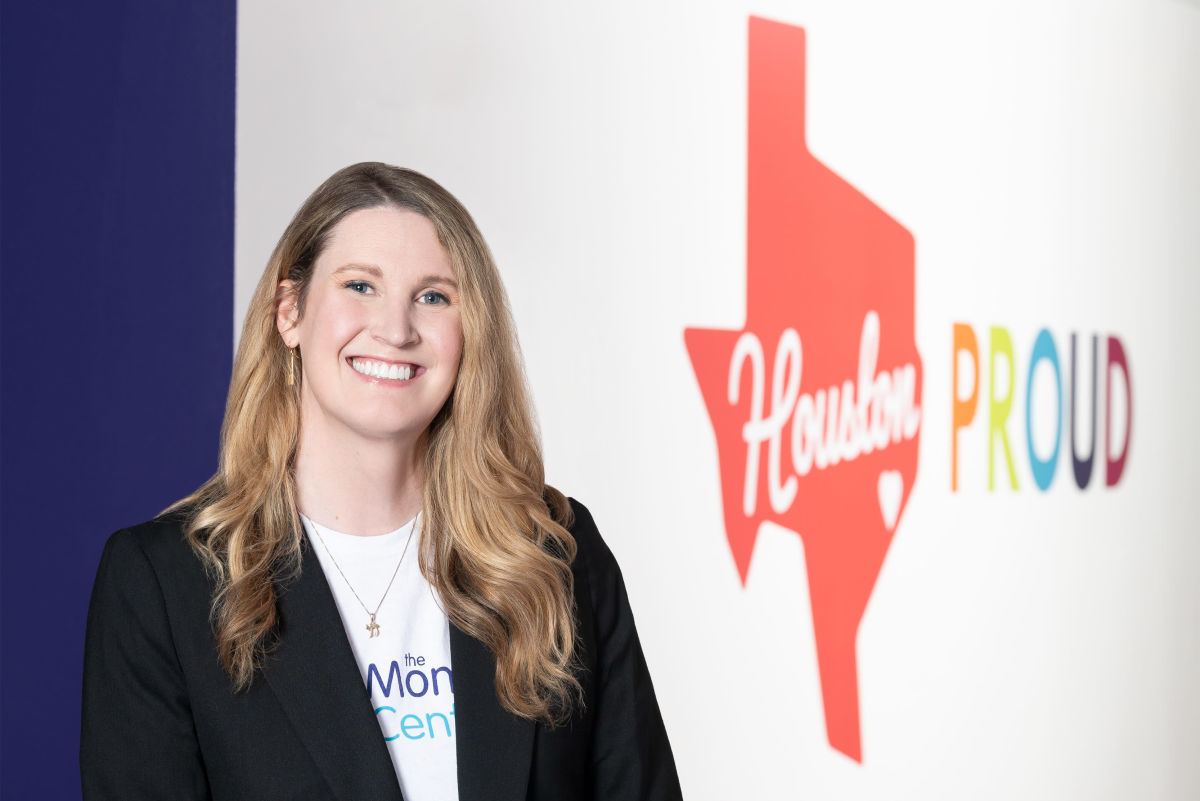
When Avery Belyeu and her partner bought a home in a quiet suburb of Dallas a few years ago, they were initially excited about meeting all their new neighbors. Belyeu, who is transgender, and her partner quickly realized their neighborhood might not be so welcoming when they started seeing a lot of political signs for a certain orange-skinned politician pop up in yards around election time. In response, they put up signs of their own, in addition to a large rainbow flag that they decided to permanently hang in front of their home.
Although not all forms of silent protest bear fruit, this one did. One day, the couple discovered a sandwich bag on their stoop containing two crocheted bumblebees, each made in the colors of the trans and nonbinary flags. In the bag was a note from a neighborhood youth letting them know how the continued presence of their rainbow flag helped them feel more safe and accepted.
Today, Belyeu, 38, is the new CEO of the Montrose Center, a position she started in February after the retirement of Ann Robison, who led the organization for 35 years. Founded in 1978, it’s one of the oldest LGBTQ+ resource centers in the nation and provides a host of services to members of the Houston area’s queer community, from mental and behavioral health services to specialized support for youth, seniors, and those living with HIV.
In a speech at a fundraiser for the center this April, Belyeu used the story of the bumblebees to illustrate the importance of visibility and the positive impacts it can have on today’s youth, especially in this climate of increasing polarity.
Belyeu is uniquely situated to lead the center at this time. In addition to being the center’s first transgender CEO when the rights of transgender people are increasingly under attack, she brings a wealth of LGBTQ+-centered civil rights leadership experience to the position through her 14-year career spent working at organizations like the Trevor Project, Lambda Legal, and the Suicide Prevention Resource Center.
This work has provided her with a broad understanding of the importance of queer-focused resource centers, which serve as the backbones of their communities through the day-to-day support they’re able to provide, support that is often not possible for more nationally focused organizations to deliver.
“I really believe in the importance of LGBTQ centers, specifically for our community, for our well-being, [and beyond that] for our community to have a place to come together and meet, collaborate, connect, celebrate, sometimes grieve, and advocate,” Belyeu says, noting that the Montrose Center is the resource for queer people living in this part of Texas.
It’s a center that Belyeu, who came out as a gay man at the age of 23 and then as a transgender woman at age 30, could have benefited from herself in her younger years. Belyeu was born and raised in a small town just north of Gainesville, Florida, a rural area full of tobacco farms and cattle ranches. She was brought up as a Jehovah’s Witness in a family she describes as extremely conservative.
“Gender norms were very strictly monitored and enforced. From a very young age, it was very clear that I was different, as it came to my gender expression and gender identity,” she says.
Some of Belyeu’s earliest memories are of her father trying to get her to change how she gestured and the inflection of her voice to encourage her to appear more masculine. At one point, she was even sent to help in her grandfather’s workshop, because her family thought learning how to use power tools and a chain saw would fix her.
“Obviously, none of that worked,” she says. “But it did create a lot of stress and create a lot of pressure.”
When Belyeu came out to her family, they responded by disowning her and completely cutting her off financially. As a result, she experienced homelessness and housing insecurity in her early adulthood as she tried to rebuild her life from scratch.
Although there has been wider acceptance of the LGBTQ+ community over the past few years, Belyeu says that about 20 percent of queer youth still face severe family rejection after coming out. Numbers like that, she says, illustrate the continued importance of chosen family in the LGBTQ+ community and underscore why it’s so crucial to educate parents on the importance of accepting the sexual orientation and gender identity of their children.
“We can form a family of choice, which of course promotes our mental wellbeing and our resilience, but nothing can quite repair [the] damage that comes from the rejection of family,” she says. “The research shows it has a really substantive impact on our mental health, wellbeing, and our risk factor for all sorts of negative health outcomes.”
Belyeu believes that her vast lived experiences make her an ideal person to lead the Montrose Center right now, from her identity as a queer trans woman to her experience of hardship after coming out.
“Lived experience is, I think, essential for understanding how to effectively collaborate with folks most impacted by injustice,” Belyeu says. “And so that’s the thing to me… That I’m grateful to be able to leverage coming into this role.”
Belyeu says doing a lot of listening by way of open houses is among her first priorities in her new position. She’s also going to launch a community advisory board and start working on a community-informed strategic planning process that will chart the future of the center for the next five years. Overall, her goal is to increase engagement with the local queer community and to make sure all voices are heard.
“As a community center, we have a mission that very explicitly speaks about a particular population,” she says. “We have a charge to make sure that we are collaborating well, that we’re listening effectively, and that we are acting upon what we hear.”



